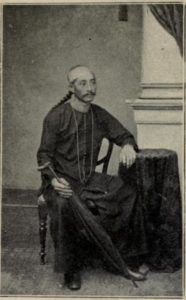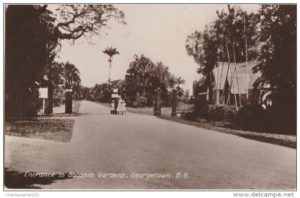Part I
British historian James Rodway (1848 -1926) wrote regularly about the colony of British Guiana, from which today we are able to learn of many aspects of our early history. One such is the story behind the names of many of the plantations of the day that have now become our towns, villages and neighbourhoods. Here is an edited excerpt of his essay entitled, “The Names of our Plantations”, published in the Timehri: the journal of the Royal Agricultural and Commercial Society of British Guiana (1911).
The estates that have been named at different times amount to about two thousand. I shall not attempt to enumerate them all for the majority give no trouble; they are simply old world place-names transferred, as is done in every new country.
![Charles Waterton arrived in Georgetown in 1804 to manage the plantations [names shown in red on map] of his father (Walton Hall) and his uncle, Christopher Waterton (La Jalousie and Fellowship), who had returned to England. In The Argosy, published in 1883, Walton Hall is recorded as being part of Hampton Court, the most northerly plantation in the colony. Walton Hall Estate now has a rice mill licensed by the Guyana Rice Development Board (as at 2009) (overtown.org.uk)](https://www.guyanatimesinternational.com/wp-content/uploads/2016/10/01-300x232.jpg)
There is more interest in those names which either anticipate or commemorate the struggles and triumphs of the early settlers. The name was not necessarily given at the time of the grant, it follows therefore that some are retrospective and give us a peep into the life of our pioneers.
No doubt they thought a good name might bring good fortune; possibly they invoked the goddess in such names as Lucky Hit, Lucky Spot and Goed Fortuin. Unfortunately however their hopes were often disappointed and the estates went to rack and ruin; to-day most of them are taken over by the forest.
Successes proved failures, Good Hopes ended in despair. Freedom (Vryheid) meant slavery a century ago; Paradise and the Garden of Eden were hardly abodes of happiness; even Arcadia has lost its ideal position as a coffee plantation. El Dorado did not bring its owner gold, and notwithstanding its supposedstrength, Gibraltar became of little consequence.
In looking over a chart where the names are inserted we can see the course of settlement.
Until 1740, no one could get land unless he was a Dutch subject; it follows therefore that the names in the neighbourhood of Kyk-over-al, and on the upper Berbice and Canje, are Dutch.
After 1740, Essequibo was opened to all nations with a consequent influx of English from the West Indies, followed later by a fair number of French.
The upper Demerara was largely English (or Barbadian), the French occupied the West Bank and the sides of the Canals, with a few on the East and West Coasts.
Until the British conquest however, the coast from Mahaica to the Corentyne had been neglected; then came the boom in cotton and a succession of English planters, who, of course, gave British names.
Here we find Albion, Chiswick, Hammersmith, Epsom, Brighton, Clifton, Liverpool, etc. Dunrobin, Fyrish, Auchlyne, Kilmarnock and Tarlogie, as well as Carnarvon; proving that English, Scotch, and at least one Welshman were present.
The Canals and their neighbourhood have Middlesex, Westminster, and Vauxhall —Versailles and Bordeaux — Ostend and Vriesland, indicating that the three nationalities were neighbours.
Although the United Kingdom is most conspicuous on the East Coast, we find Chateau Margot, La Bonne Intention, Mon Repos, etc., French, and Goedverwagting, Sparendaam, etc., Dutch.
The Barbados system of naming estates from the owners, without any addition, is hardly known here (Ogle is an example), but Little England is well to the fore as might be expected, especially in those named Halls.
We have Barbados Hall, Planter’s Hall, Bounty Hall, Tranquillity Hall, Airy Hall, Quaker’s Hall, Harmony Hall, Carlton Hall and Broom Hall. (Walton Hall is named after the Yorkshire family mansion of the Watertons.)
Personal names are represented by Waller’s Delight, Keirfield, and Christianburg, the last from Christian Finet, the original owner, a Swede; Huis’t Couverden is doubtful.
A conspicuous class is named after ladies of the family, e.g., Kitty, Sophia, Cornelia Ida, Eve Leary, Ann’s Grove, Elizabeth Hall, and Susannah’s Rust (rest). A curious name is Amelie’s Waard, probably meaning the house of Amelia’s host, guardian, or landlord.
An affectionate son would perpetuate his love to a father or mother by Le Bon Pére and La Bonne Mere, a kind brother by Sisters or Two Sisters, and a father by De Kinderen (the children). (TO BE CONTINUED)





